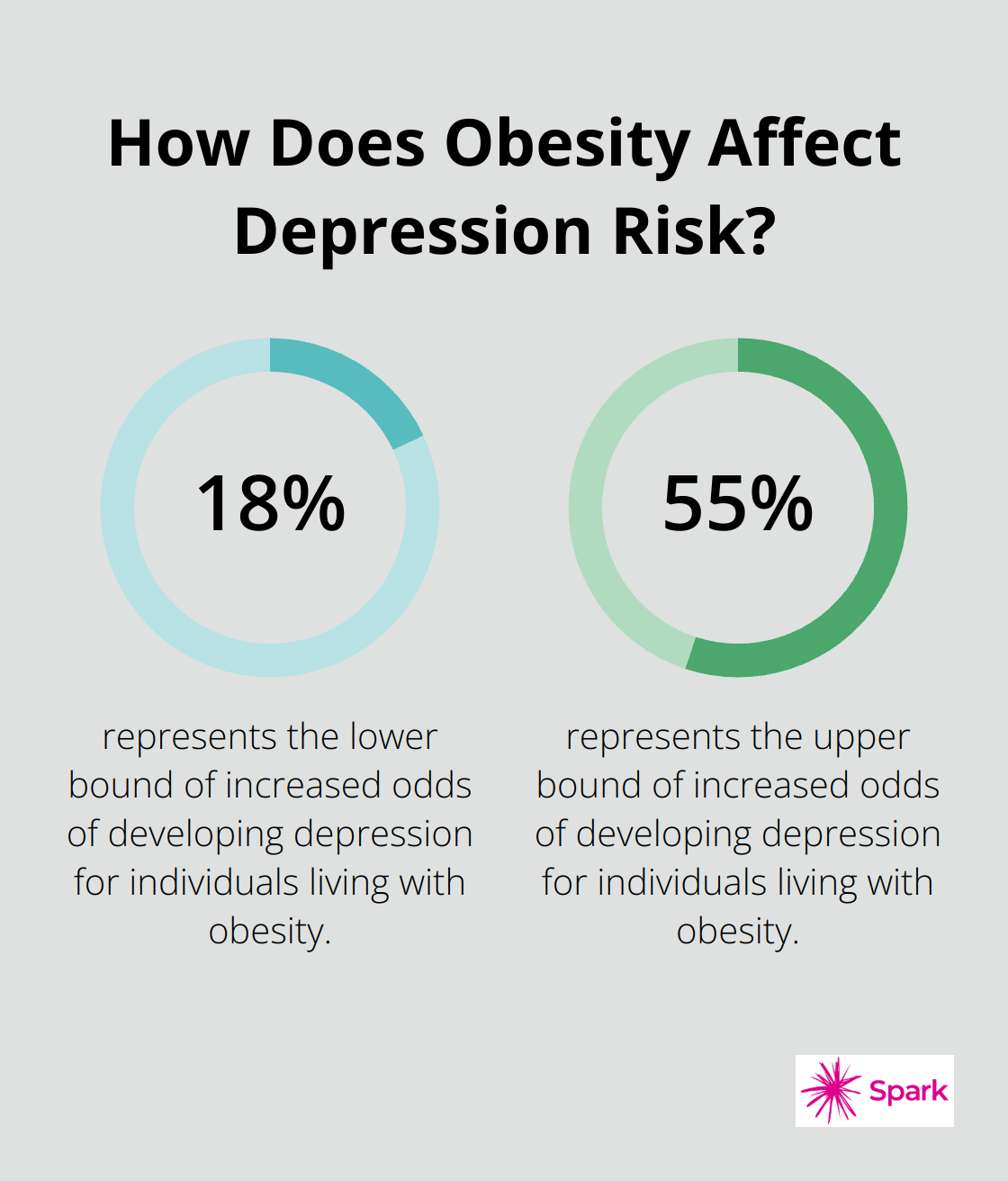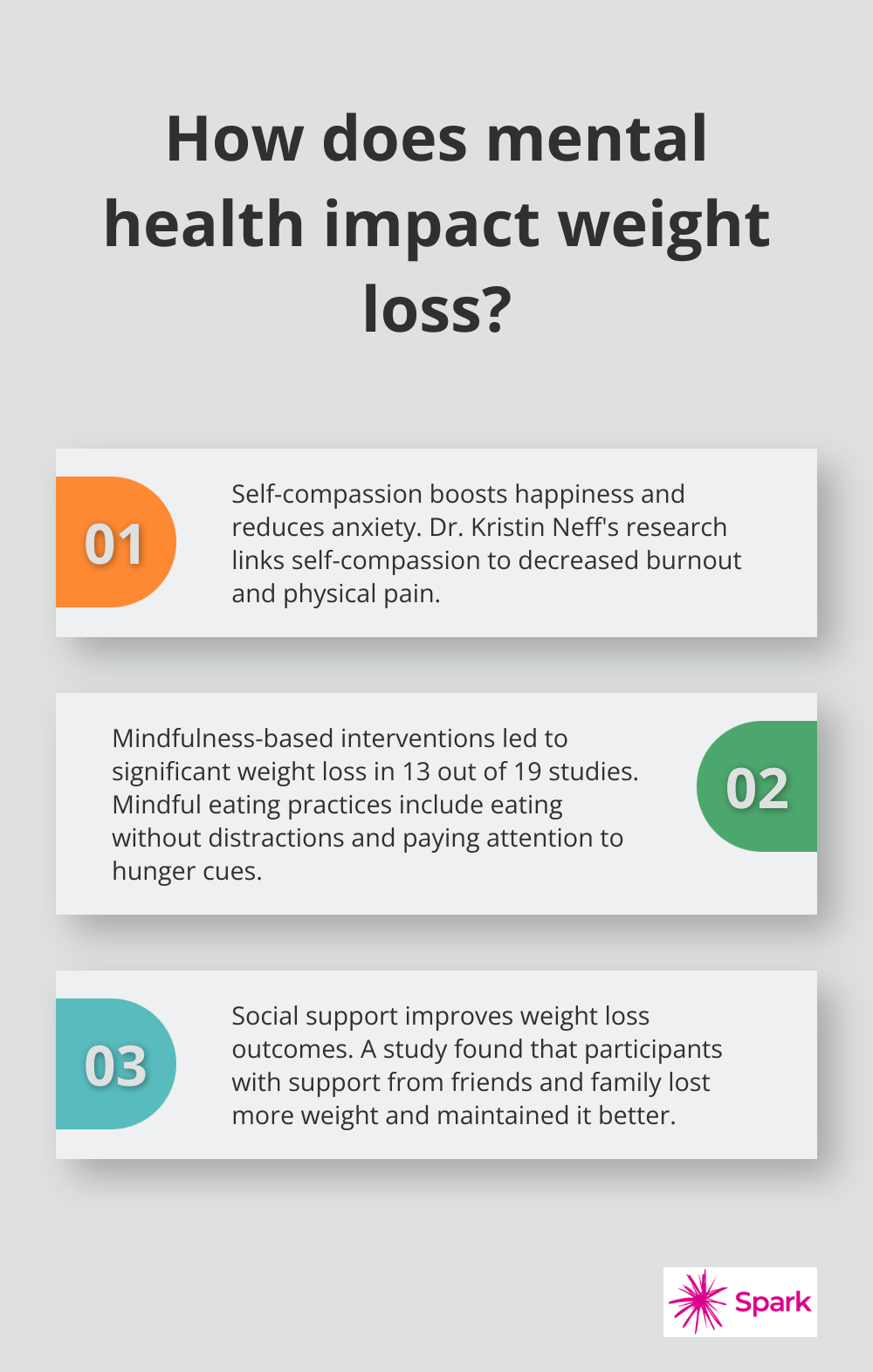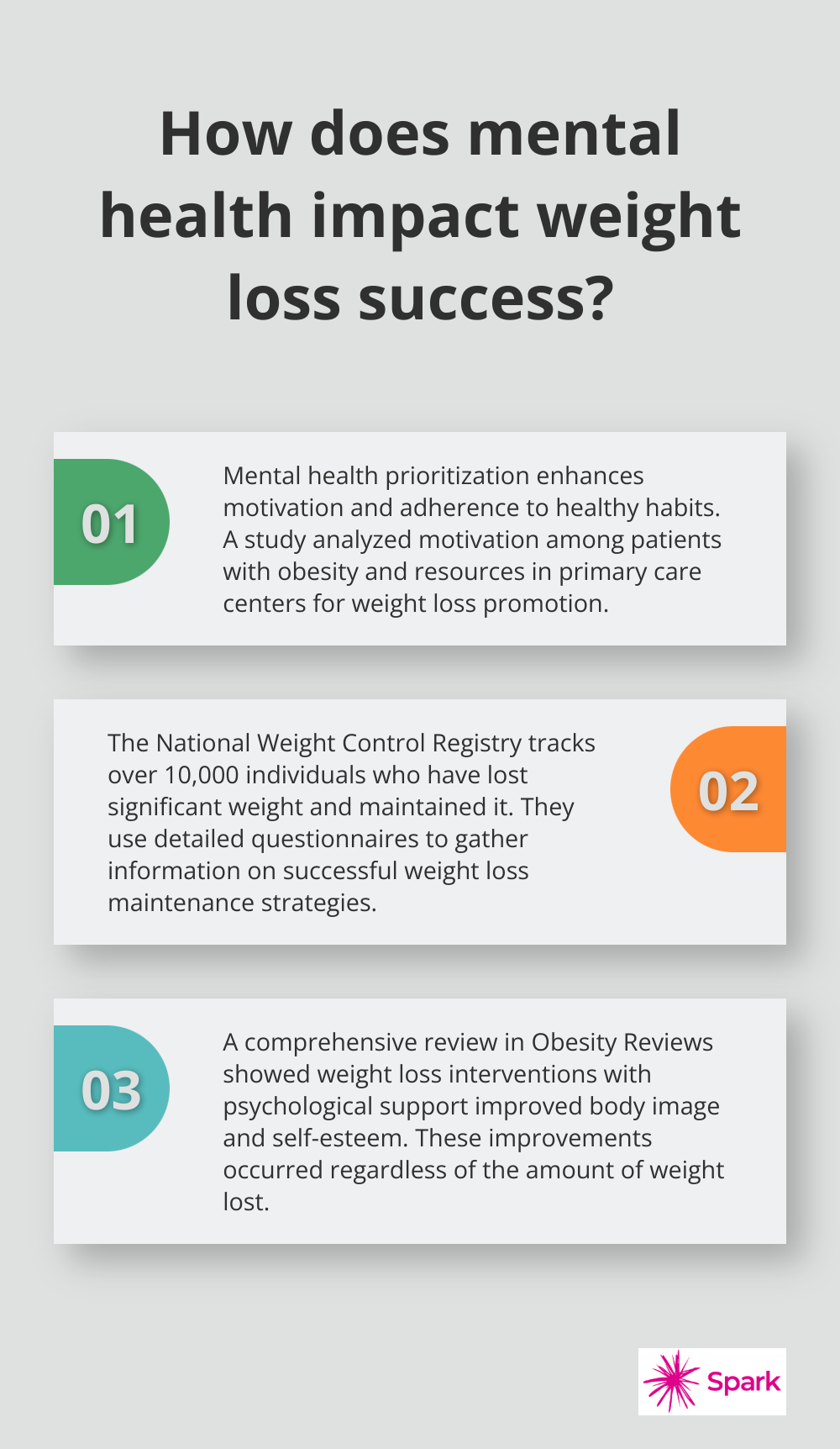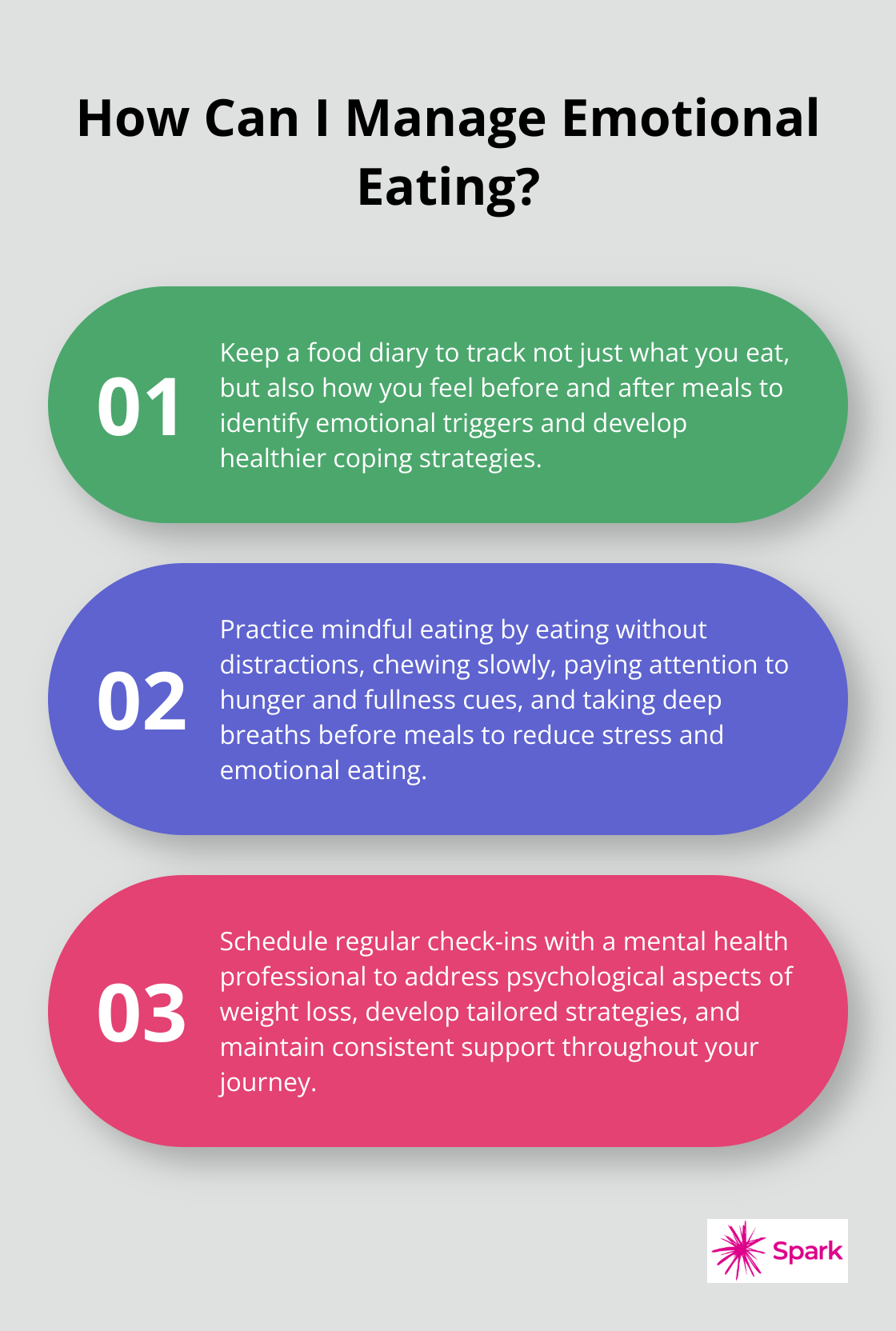At Spark Healthcare, we understand that successful weight loss is about more than just diet and exercise.
Mental health plays a crucial role in achieving and maintaining a healthy weight.
In this post, we’ll explore the intricate connection between mental health and weight loss, offering practical strategies to support your journey towards a healthier you.
Mental Health and Weight: A Two-Way Street
The Impact of Stress on Eating Habits
Stress often triggers unhealthy eating behaviors. When stressed, our bodies release cortisol, a hormone that increases appetite and cravings for high-calorie foods. Chronic stress has been linked with obesity and weight gain in several studies, although not all studies have found this association.

To combat stress-induced eating, try to incorporate stress-reduction techniques into your daily routine. This could include deep breathing exercises, regular physical activity, or professional support through telepsychiatry services.
Anxiety, Depression, and Emotional Eating
Anxiety and depression significantly affect eating patterns. Many individuals turn to food as a coping mechanism for negative emotions (a behavior known as emotional eating). Research shows that individuals living with obesity have 18% to 55% increased odds of developing depression.
Recognizing the signs of emotional eating is important. Keep a food diary to track not just what you eat, but also how you feel before and after meals. This can help identify emotional triggers and develop healthier coping strategies.
Breaking the Cycle of Emotional Eating
Emotional eating can create a vicious cycle of guilt and further negative emotions, leading to more overeating. To break this cycle, it’s essential to develop alternative coping mechanisms. Some effective strategies include:
- Practice mindful eating
- Engage in hobbies or activities you enjoy
- Reach out to friends or support groups
- Seek professional help from mental health experts
The Role of Body Image in Weight Management
Poor body image can be both a cause and consequence of weight issues. Negative self-perception can lead to decreased motivation and self-sabotaging behaviors. A study found that improved body image mediated the effects of obesity treatment on eating self-regulation.
Improving body image is an important step in successful weight management. This might involve challenging negative self-talk, focusing on health rather than appearance, and celebrating non-scale victories in your weight loss journey.
The connection between mental health and weight loss is clear. Addressing psychological factors creates a solid foundation for achieving weight loss goals. In the next section, we’ll explore specific strategies to improve mental health and support your weight loss journey.
How to Improve Mental Health for Weight Loss
Cultivate Self-Compassion
Self-compassion forms the foundation of a positive body image and self-esteem. Dr. Kristin Neff’s research links self-compassion to boosting happiness, reducing anxiety and depression, decreasing burnout, and physical pain, which can positively impact weight loss efforts.

Speak to yourself as you would to a close friend. When you face a setback in your weight loss journey, acknowledge it without judgment and focus on learning from the experience.
Practice Mindful Eating
Mindfulness can reduce stress and emotional eating. A study found that mindfulness-based interventions led to significant weight loss in 13 out of 19 studies reviewed.
To practice mindful eating:
- Eat without distractions (no TV, phone, or computer).
- Chew slowly and savor each bite.
- Pay attention to hunger and fullness cues.
- Take a few deep breaths to center yourself before eating.
Build Your Support Network
Social support maintains emotional well-being during weight loss. A study in the Journal of Consulting and Clinical Psychology found that participants with support from friends and family lost more weight and maintained their weight loss better.
Join a support group, either in-person or online. Share your journey with others who understand to gain motivation, accountability, and emotional support.
Set Realistic Goals
Unrealistic expectations can lead to disappointment and negatively impact mental health. The National Institute of Diabetes and Digestive and Kidney Diseases recommends a weight loss of 1 to 2 pounds per week as a healthy and sustainable goal.
Break down your larger weight loss goal into smaller, achievable milestones. Celebrate non-scale victories (such as improved energy levels or better sleep quality) to maintain motivation and positive self-image.
Seek Professional Help
Professional guidance can provide tailored strategies for your unique mental health and weight loss needs. Telepsychiatry services (like those offered by Spark Healthcare) can connect you with mental health professionals who specialize in weight management issues.
These experts can help you address underlying psychological factors, develop coping mechanisms, and create a personalized plan that integrates mental health improvement with your weight loss goals. Their support can prove invaluable in navigating the complex interplay between mental health and weight management.
As we explore the benefits of addressing mental health in weight loss programs, it becomes clear that a holistic approach yields the most sustainable results.
Why Mental Health Matters in Weight Loss
Boosting Motivation and Consistency
Mental health prioritization equips individuals to maintain motivation and adhere to healthy habits. A study analyzed motivation to lose weight among patients with obesity and the resources implemented by primary care centers to promote weight loss.
Enhancing Long-Term Success
Mental health interventions improve long-term weight maintenance. The National Weight Control Registry is tracking over 10,000 individuals who have lost significant amounts of weight and kept it off for long periods of time. They use detailed questionnaires to gather information about successful weight loss maintenance strategies.
Improving Overall Well-being
Mental health support in weight loss interventions enhances overall quality of life. A comprehensive review in Obesity Reviews showed that weight loss interventions with psychological support led to improvements in body image, self-esteem, and general mental health (regardless of the amount of weight lost).
Strategies for Maximizing Benefits
- Regular Check-ins with Mental Health Professionals
Schedule consistent appointments with a mental health expert to address psychological aspects of weight loss. These professionals can provide tailored strategies and support throughout your journey.
- Participation in Support Groups
Join weight loss support groups to connect with others facing similar challenges. These groups offer emotional support, practical tips, and accountability (which can significantly boost your motivation).
- Mindfulness Practices for Weight Management
Incorporate mindfulness techniques into your daily routine. Try mindful eating exercises, body scan meditations, or stress-reduction practices to improve your relationship with food and your body.
- Cognitive Restructuring Techniques
Work with a mental health professional to identify and challenge negative thought patterns related to weight and body image. This process can help you develop a more positive and realistic mindset, supporting your weight loss efforts.
The Role of Telepsychiatry in Weight Loss Support
Telepsychiatry services provide convenient access to mental health support for individuals on their weight loss journey. Research suggests telehealth is a viable care alternative with no significant differences between in-person and telehealth groups in depressive symptom reduction.

Final Thoughts
Mental health and weight loss intertwine to form a complex relationship that impacts overall well-being. Psychological factors such as stress, anxiety, and depression influence eating habits and weight management. We at Spark Healthcare recognize the importance of addressing both physical and psychological aspects for sustainable weight loss success.

Professional help can provide valuable tools and strategies to overcome obstacles in your weight loss journey. Our telepsychiatry services offer personalized care for conditions like anxiety and depression, which often intersect with weight issues. Mental health support equips individuals with the resources to maintain motivation and adhere to healthy habits.
Your path to a healthier weight is unique, and it’s acceptable to seek assistance along the way. A holistic approach that prioritizes both mental and physical health sets the foundation for lasting success and improved well-being. Take the first step today towards a healthier, happier you (your future self will thank you).






